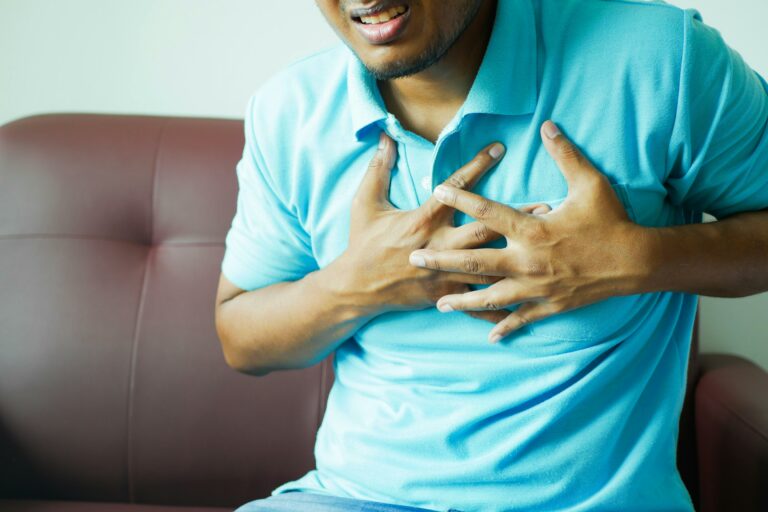Introduction
Experiencing chest pain can be alarming and should never be ignored. It can be caused by various conditions, ranging from mild issues like acid reflux to serious medical emergencies such as heart attacks. Seeking the right chest pain treatment is crucial for ensuring your health and well-being. Understanding the causes and available treatments can help you make informed decisions about your health.
Understanding Chest Pain: Causes and Symptoms
Chest pain can stem from numerous conditions. Some of the most common causes include:
1. Heart-Related Causes
Heart attack (Myocardial infarction)
Angina (Reduced blood flow to the heart)
Pericarditis (Inflammation of the sac around the heart)
Aortic dissection (A tear in the major artery)
2. Lung-Related Causes
Pulmonary embolism (Blood clot in the lungs)
Pneumonia
Pleurisy (Inflammation of lung lining)
3. Gastrointestinal Causes
Acid reflux (GERD)
Esophageal spasm
Gallbladder disease
4. Musculoskeletal Causes
Costochondritis (Inflammation of rib cartilage)
Muscle strain
5. Anxiety and Panic Attacks
Stress-induced chest pain
Hyperventilation
10 Effective Chest Pain Treatment Options
1. Seek Emergency Medical Help
If chest pain is sudden, severe, or accompanied by symptoms such as shortness of breath, nausea, or dizziness, call 911 immediately.
2. CPR and First Aid for Severe Cases
For individuals who lose consciousness due to suspected cardiac arrest, CPR (Cardiopulmonary Resuscitation) should be administered immediately.
3. Medications for Chest Pain Relief
Depending on the cause, doctors may prescribe medications such as:
Aspirin – Helps reduce blood clotting in heart-related conditions.
Nitroglycerin – Used for angina relief by improving blood flow.
Antacids – Helps if the pain is caused by acid reflux.
Pain Relievers – Ibuprofen or acetaminophen for musculoskeletal pain.
4. Oxygen Therapy
Patients experiencing breathing difficulties may receive supplemental oxygen to stabilize their condition.
5. Lifestyle Changes for Heart Health
Adopting a heart-healthy lifestyle can reduce the risk of future chest pain episodes:
Maintain a balanced diet rich in fruits and vegetables.
Exercise regularly.
Manage stress effectively.
6. Cardiac Procedures and Surgery
For severe heart-related conditions, medical procedures may be necessary:
Angioplasty – Opens blocked arteries.
Bypass Surgery – Redirects blood flow to avoid blocked arteries.
7. Treatment for Acid Reflux and Digestive Issues
Patients suffering from GERD may benefit from lifestyle changes, medications, and in severe cases, surgery.
8. Pulmonary Treatments for Lung Conditions
If chest pain is due to lung diseases, treatments may include:
Antibiotics for pneumonia
Blood thinners for pulmonary embolism
9. Physical Therapy for Musculoskeletal Pain
For chest pain caused by strained muscles or rib injuries, physical therapy and pain management strategies are effective.
10. Anxiety and Stress Management
For stress-induced chest pain, relaxation techniques such as yoga, deep breathing, and therapy can be beneficial.
When to Visit ER OF COPPELL for Chest Pain Treatment
If you experience any of the following symptoms along with chest pain, visit ER OF COPPELL immediately:
Intense chest tightness or pressure
Pain radiating to the arms, jaw, or back
Difficulty breathing
Sudden dizziness or fainting
Sweating or nausea
FAQs About Chest Pain Treatment
Q1: How do I know if my chest pain is serious?If your chest pain is severe, persistent, or accompanied by shortness of breath, dizziness, or nausea, seek emergency care immediately.
Q2: Can anxiety cause chest pain?Yes, anxiety and panic attacks can cause chest pain that mimics a heart attack. However, it’s important to rule out cardiac issues first.
Q3: What should I do if I experience chest pain at home?If the pain is mild, try resting, taking deep breaths, and drinking water. If it worsens, seek medical attention.
Q4: Can heartburn cause chest pain?Yes, acid reflux can lead to burning chest pain that may feel like a heart attack.
Q5: What is the best way to prevent chest pain?Maintain a healthy diet, exercise regularly, manage stress, and avoid smoking or excessive alcohol consumption.
 :
https://coppellemergencyroom.com
:
https://coppellemergencyroom.com












